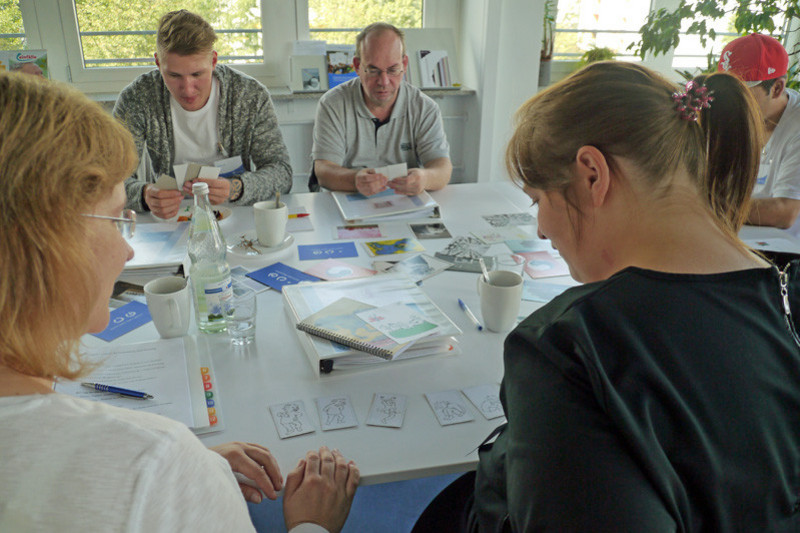Peer-to-peer: Model Project Offers Counselling from and for Individuals with Cognitive Disabilities

It's more than a law of physics that “like attracts like”: as countless scientific studies have shown, people are more likely to trust and cooperate with those who are most like them. This principle forms the basis of peer counselling, in which counsellors and counselees interact as equals. After all, as peers, both have had similar experiences, and they share common needs, desires, and worries.
The Development of Peer Counselling
The idea of “peer counselling” was developed in the late 1930s; even at that time, it was believed that people who had already experienced and successfully conquered alcoholism would be particularly effective in helping others to manage their alcohol problems. This was the start of “Alcoholics Anonymous,” the first peer-counselling organization. Today, “counselling by the affected, for the affected” is mostly known from the field of therapy for individuals with physical handicaps. The history of this approach is closely intertwined with the Disability Rights Movement. In the 1960s, the “Independent Living Movement” developed - first in the USA and later in many other countries - with the goal of achieving full societal participation for all individuals with disabilities.
An Inclusive Approach at Lebenshilfe Berlin
Since 2015, Lebenshilfe Berlin has been employing just this kind of inclusive approach. Its unique concept of establishing participative counselling by and for individuals with cognitive disabilities is not yet common in Berlin, nor in the region. Despite this, it's not the initiative's primary goal to fill this peer-counselling gap, explains project leader Nicole Genandt. Rather, the goal is to support and enable the self-determination and self-empowerment of disadvantaged individuals. As Genandt well knows, “individuals with disabilities often live in dependent situations and in hierarchical structures.”
Empowerment and Participation for Counsellors and Counselees
During peer counselling, individuals encounter a real-life partner who is able to better understand and answer their questions than others may be. Peers can encourage, motivate and serve as an example. During the counselling sessions, the counsellors' own perspectives and emotions, but also their self-confidence and courage, become part of the interaction. This helps to strengthen the self-confidence and self-esteem of the disabled counselees. But furthermore, as Nicole Genandt notes, “for the counsellors, as well, this form of empowerment and participation can lead to a positive development: they are taken seriously as experts in their own area, and they feel accepted for their experiences and, not less importantly, for their personalities.”
Ten-month Training Program
First, however, the counsellors must learn how to counsel others and receive training to face the work's challenges. With financial assistance from Aktion Mensch and the Software AG Foundation, the Lebenshilfe association was able to develop a ten-month training program and to carry it out for the first time from April 2016 to January 2017. Starting in 2017, trained counsellors with cognitive disabilities will offer peer counselling on the topics of “Living with Assistance” and “Addiction” - an enrichment to the existing counselling landscape in the German capital. In addition to their counselling work, all of the trained counsellors also volunteer at Lebenshilfe in a workshop for persons with disabilities - and so have the opportunity to regularly work together with others both with and without disabilities.
A Model Project for Other Organisations
Lebenshilfe Berlin - which was established in 1960 as a self-help organization for parents of children with cognitive disabilities - wants to see this participative approach established far beyond their own counselling program: they also provide information for other outreach centers and work to promote the use of peer counsellors. They hope to thereby reduce the barriers experienced by individuals with disabilities in seeking help and enable more counselling among equals. Konrad Lampart, Project Manager at the Software AG Foundation (SAGST), notes that this is important to improve the life quality of disabled individuals. “Here at SAGST,” he notes, “we believe that every individual can, within his individual possibilities, participate in society and make a contribution to it. That's why the peer counselling at Lebenshilfe Berlin is such a great model project: one that is taking a new approach to the inclusion of individuals with disabilities and that, as an inclusive project, can serve as a paragon for other organizations.”
